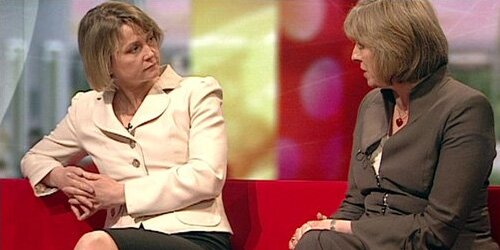The OBR has picked a major fight with David Cameron
5:04 pm - March 8th 2013
| Tweet | Share on Tumblr |
OBR head Robert Chote has written to David Cameron disputing a claim he made in yesterday’s major speech on the economy.
As Chote writes, the PM claimed yesterday that:
As the independent Office for Budget Responsibility has made clear…
…growth has been depressed by the financial crisis…
…the problems in the Eurozone…
…and a 60 per cent rise in oil prices between August 2010 and April 2011.
They are absolutely clear that the deficit reduction plan is not responsible.
In fact, quite the opposite.
But Chote points out that this is simply not the case.
For the avoidance of doubt, I think it is important to point out that every forecast published by the OBR since the June 2010 Budget has incorporated the widely held assumption that tax increases and spending cuts reduce economic growth in the short term.
Specifically Chote writes that austerity measures in 2011/12, by the OBR’s estimate, reduced growth by 1.4%. None of which is to claim that other factors (rising commodity prices/the Eurozone/etc) did not impact on growth.
This is a welcome intervention from Robert Chote. If we are going to have a serious debate about the economy we at least need to get the facts straight. As Simon Wren-Lewis wrote yesterday:
the OBR has never said that austerity has had no impact on growth. What they have talked about is why growth has been lower than they expected back in 2010. As they had austerity built in to their forecasts of 2010, then they have naturally looked elsewhere for events they were not expecting. [b] So this statement deliberately misrepresents what the OBR has been saying, to imply that the OBR believes in expansionary austerity. But the Prime Minister knows that the OBR will let this misrepresentation of its views pass – which is a shame. I guess you can robustly misrepresent.
The OBR have not let this ‘misrepresentation of their views’ pass.
I think the key line from Cameron that has caused him problems is actually, ‘They are absolutely clear that the deficit reduction plan is not responsible. In fact, quite the opposite”. What exactly did he mean by the opposite being true? I read this a claim that fiscal contraction actually increased growth – something for which there is obviously no evidence at all.
The real story today is that the PM made a speech claiming that austerity was not a cause of weak growth and that the OBR agreed with him. The OBR have very rightly pointed out that this is not true.
Almost unbelievably, Downing Street have responded by saying:
The OBR has today again highlighted external inflation shocks, the eurozone and financial sector difficulties as the reasons why their forecasts have come in lower than expected. That is precisely the point the prime minister was underlining.
The OBR write to the Prime Minister rebuking him for misquoting them and he responds that this underlines the very point he was making. >That is almost as bad as losing an AAA rating and then to retain the AAA rating was correct along.
The OBR letter
| Tweet | Share on Tumblr |  |
Duncan is a regular contributor. He has worked as an economist at the Bank of England, in fund management and at the Labour Party. He is a Senior Policy Officer at the TUC’s Economic and Social Affairs Department.
· Other posts by Duncan Weldon
Story Filed Under: Blog ,Economy
Sorry, the comment form is closed at this time.
Reader comments
I think this is because the austerity package has an ideological basis. An eminent social policy writer, in the department I study within has pointed out that the UK government are intending to cut much faster and further than other European countries. They are cutting beyond what is needed to cut the deficit and will, if the intended package of cuts is successful, put us, by 2015, in a position where we are spending less than America per capita.
I think they are hell bent on using this “opportunity” to cut back the welfare state. Thus I think they will use any kind of propaganda to avoid being challenged on that, and will insist on continuing in the same direction whatever arguments come up against it.
“Sir Alan Budd, the first chairman of the Offoce of Budget Responsibility, said he believed the OBR had rebuked David Cameron because he ‘made an error’.”
http://www.itv.com/news/update/2013-03-08/cameron-made-an-error-says-sir-alan-budd/
Sir Alan was Ed Balls’s immediate predecessor as chief economic adviser in HM Treasury, a position he held throughout Kenneth Clarke’s time as chancellor. Norman Lamont, the previous chancellor, and Alan Budd introduced inflation targetting as the principal policy objective of monetary policy.
One challenging issue now is not whether Cameron was wrong but whether he intended to mislead or whether, as some of us suspect, he is fixated on an invalid understanding of Britain’s economy, its problems and the policy options.
As for claiming that the government’s “austerity policy” was not affecting business confidence, compare this:
“UK Business Investment Drops by £400m in Fourth Quarter”
http://www.ibtimes.co.uk/articles/440021/20130227/uk-business-investment-ons-q4-economy.htm
The other challenging issue is whether this “correction” will make any difference downstream to the government’s fiscal policy. Somehow that seems doubtful as Cameron keeps saying: There is no alternative.
Wow! So David Cameron and the Conservative led coalition government are liars! Who knew!
This was posted earlier but for some extraordinary reason it seems to have been censored out:
“Sir Alan Budd, the first chairman of the Offoce of Budget Responsibility, said he believed the OBR had rebuked David Cameron because he ‘made an error’.”
http://www.itv.com/news/update/2013-03-08/cameron-made-an-error-says-sir-alan-budd/
Sir Alan was Ed Balls’s immediate predecessor as chief economic adviser in HM Treasury, a position he held throughout Kenneth Clarke’s time as chancellor. Norman Lamont, the previous chancellor, and Alan Budd introduced inflation targetting as the principal policy objective of monetary policy.
A challenging issue now is not whether Cameron was wrong but whether he intended to mislead or whether, as some of us suspect, he is fixated on an invalid understanding of Britain’s economy, its problems and the policy options.
As for claiming that the government’s “austerity policy” was not affecting business confidence, compare this:
“UK Business Investment Drops by £400m in Fourth Quarter”
[ibtimes.co.uk]
They are just purely doing these cuts for ideological reasons and not pragmatic reasons aren’t they?
1. Carrie & 4. SteveM
Opposition to the cuts and austerity is also ideological. It’s just a different ideology. It’s no surprise that Ed Balls etc disagree with the tories. I’m sure that even if Osborne adopted Balls’ policies (whatever they are) then the labour party would be against them for ideological reasons.
“They are just purely doing these cuts for ideological reasons and not pragmatic reasons aren’t they?”
FWIW I think the Conservatives are so fixated on a particular narrative of how the economy works and the policies needed to fix the economy that nothing will shift them from that, not even the facts. All is compounded by Cameron repeatedly claiming: There is no alternative, which means there can be no change in policy without a change in leadership when the only credible alternative at present is Boris Johnson.
Possibly this poll finding in Saturday’s press will induce some reflection:
Labour on course for big election win, according to Tory poll
Survey by Conservative donor Lord Ashcroft finds Labour would take 93 seats from Tories if a general election were held now
http://www.guardian.co.uk/politics/2013/mar/09/labour-election-win-tory-poll
What I think will happen is that Cameron will recall that Conservative governments in the 1980s through to the 1992 election faced down bad polls and got re-elected in 1983, 1987 and 1992.
On the question of whether Cameron intentionally misled, I think he belies his own lies because he desperately wants to. He lies to himself. The Big Society was the biggest lie ever, but he believed it, not because of a loss of common sense or the disappearing facts, but because he desperately wants to believe it.
This makes him incapable of governing.
@at JC If wanting to protect the well being of people on low incomes (or without a source of income) is ideological, then, yes, maybe the opposition to the cuts is also ideological. The difference however, is that it also contains a pragmatic necessity. People obviously need basic material security, access to health provision etc.
I don’t think the same can be said for about an ideological background for introducing an austerity package that is more severe than it needs to be, especially as it isn’t actually making anything any better.
@Carrie
“They are cutting beyond what is needed to cut the deficit ”
Really? I only wish this was true. You do realise that even if they reduce the deficit to nil there will still be this huge pile of debt to deal with??
“The difference however, is that it also contains a pragmatic necessity. People obviously need basic material security, access to health provision etc.”
So you don’t think it is a neccessity to reduce our huge debt pile? You think the markets will simply continue to allow us to borrow at 10% of GDP indefinetly?
Dan McCurry: “He lies to himself.”
I think that charitable explanation is probably the most likely. Cameron dwells in a world of self-delusion.
From a political perspective, he has made the basic mistake for a prime minister of binding himself to the chancellor, which means Cameron has lost the option of shifting Osborne to another post in order to adjust the government’s economic strategy in the light of incoming facts. And those surely unwelcome facts include the worrying reality that government borrowing is actually going up, not down. What’s even worse, government borrowing is rising faster than Britain’s GDP so the national debt burden is increasing:
“The Office for National Statistics said that once special factors such as the transfer of the Royal Mail Pension fund and QE profits were excluded, the budget deficit for the first 10 months of the 2012-13 financial year was 6.6% higher than in the same period of 2011-12.”
http://www.channel4.com/news/january-borrowing-figures-surplus-higher-than-expected
News update: A new poll is reported in Sunday’s Observer on public sentiments towards Osborne’s austerity policies:
A majority of people now believe that the government’s economic policies are hurting rather than healing the British economy, a new poll reveals, as cabinet divisions over how best to stimulate a return to growth threaten to destabilise the coalition.
With 10 days until George Osborne delivers his crucial fourth budget, an Opinium/Observer poll shows almost three times as many voters (58%) believe the austerity drive is harming the economy as those who think it is the correct medicine to restore it to health (20%).
http://www.guardian.co.uk/politics/2013/mar/09/britons-george-osborne-opinion-poll
Reactions: Twitter, blogs
Sorry, the comment form is closed at this time.
NEWS ARTICLES ARCHIVE





















